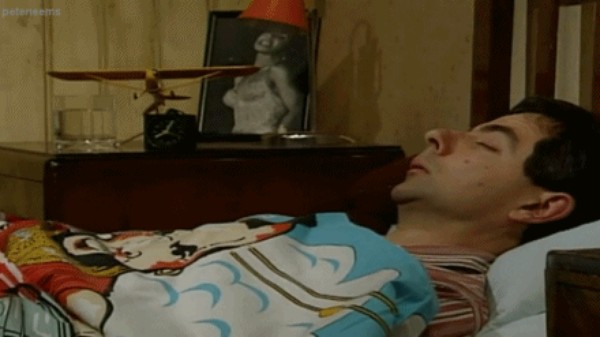Unusual body-do-sleep actions that we don't know
Dancing with hands and feet, "dropping bombs", saying dreams . are odd actions that only appear when you are in a deep sleep.
Self-acting series of body actions when sleeping
So what do scientists say about this action? Is it possible for people to control their behavior when sleeping? In fact, when sleeping, the human cognitive control department also rests, leading to many unpleasant actions that can happen without our knowledge.
Here are the 4 more humorous actions that we have definitely encountered when sleeping at least a few times .
1. The limbs are chiseled, like a child
Every morning when you wake up, you see your bed like a battlefield, pillows, blankets, and stuffed animals in one place? If you fall into this situation, it is possible, in your sleep, your arms and legs are playing, playing around with the objects around.

According to experts, the limb limb during sleep is often referred to as the periodic limb movement disorder (PLMD).
This syndrome occurs in 4% of adults and is most common in the elderly and women. PLMD occurs in the first half of sleep, before REM (Rapid Eye Movement).
People with this syndrome often move their limbs unconsciously during sleep for 20-40 seconds, so they sometimes create awkward postures when sleeping. Of course they often don't remember when they wake up.
The cause of the syndrome so far is not well understood. However, a number of factors increase the likelihood of getting PLMD including shift work, harmful food use.
In addition, women are also involved in a number of factors such as heart disease, skeletal muscle, or excessive physical activity before bedtime.
2. Sleep dreams "poetry" leader
The truth is, about 5% of adults say dreaming during sleep , according to the Sleep Sleep Association of America. Most of these dreams only last an average of about 30 seconds.

According to Christopher Winter, at the Sleep Center of Martha Jefferson Hospital (Virginia), dreaming usually occurs within the first hour or two of sleep.
At that time, the body is entering a deep sleep stage, when the muscles that control the pronunciation are still able to function. Therefore, people tend to create unconscious sounds or mouth movements and are associated with what happens in your dreams.

However, if you often encounter this situation, do not worry too much because there is no evidence to prove the harm that dreams cause for the human body.
Even so, you should go to sleep separately to avoid being woken up in the middle of the night because of your own dream poems.
3. Drop in unproductive "bulls" bombs
You may feel a little nervous when you hear this. But during the night, our anal sphincter is more relaxed than during the day, making it easier for air inside the digestive system to escape.
As a consequence, in sleep, people often discharge from 1 to 2 atomic bombs.

What's more happy than free to drop bombs that nobody finds out!
However, it is quite fortunate that these " bombs " don't smell like they were when you were awake. Why? It is simply because people's sense of smell decreases during sleep.
Therefore, even if you share a room with another person, you can rest assured that these "bombs" will not be detected.
4. Fallen when "pregnant" to dream
Have you ever found yourself falling in a dream? If you have ever experienced, you will know that feeling is so real that it almost immediately wakes up.
The dream phenomenon that finds yourself falling is also known by another name as ' dream convulsions '. It occurs in most people, including healthy people.
Specifically, when you have convulsions when dreaming, you will find yourself falling from the sky, or tripping on a cliff. Falling in the dream makes the heart rate increase, breathing faster, sweating and causing a shocking feeling that everyone must start to wake up.

The question is why do we dream of falling? Researchers are still uncertain about the correct answer. But most likely, this phenomenon occurs when you are tired, sleepless, or stressed.
At that time, the brain goes into the sleep cycle quickly but the body does not catch up, causing sudden contractions of asynchronous contractions, creating a feeling of imbalance and thereby stimulating hallucinations. fall.
- 5 facts to help you sleep better
- Why don't we fall off the bed while we sleep?
- Strange things happen to the body when sinking to sleep
- Getting your feet out will be easier to sleep
- Decode the mystery that happens in sleep
- What time to sleep is good for your health
- Difficult question: Do fish sleep?
- Things happen during sleep
- Practicing the '4-7-8' method helps you sleep like a child in just 60 seconds
- How to sleep well when the heat is nearly 40 degrees C
- Everyone's 'embarrassing' moments are of the brain
- 4 taboo while sleeping to avoid harm to the body
 'Fine laughs' - Scary and painful torture in ancient times
'Fine laughs' - Scary and painful torture in ancient times The sequence of numbers 142857 of the Egyptian pyramids is known as the strangest number in the world - Why?
The sequence of numbers 142857 of the Egyptian pyramids is known as the strangest number in the world - Why? History of the iron
History of the iron What is alum?
What is alum?